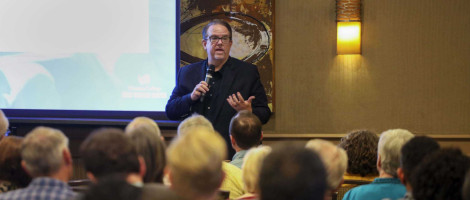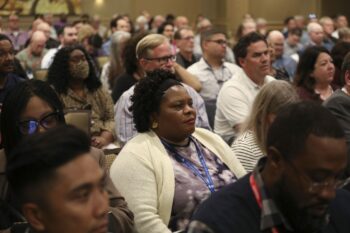Cultural change and pandemic decisions will impact churches for generations, says Ed Stetzer
by Lauren Sturdy on November 16, 2021 in Annual Meeting


The COVID-19 pandemic accelerated the impact of cultural issues in churches across the country, creating “the hardest time to lead” in the last 50 years, said Ed Stetzer, executive director of the Billy Graham Center, during his workshop at the 2021 Annual Meeting.
He spoke on the massive shakeup that has taken place in the United States in recent years and its impact on churches in a workshop Monday afternoon called “A Post-Covid Missiology.”
Stetzer called the current shift a “cultural convulsion,” or a period of rapid social change. In a moment unlike any other in our lifetime, churches are seeing more members leave over cultural issues than theological disagreements.
“It feels like a lot has been shaken and we’ll see what will remain,” he said.
Churchgoers have taken note of how their church talked about or ignored George Floyd’s murder, the 2020 summer riots, civil rights protests, COVID-19 safety protocols and the 2020 election results.
Some conversations in the wider culture, like those around systemic racism and marriage equality, have been decades in the making. Gender identity is a newer idea, for example, he said, with social change and cultural acceptance happening at a much faster rate.
“Some of the fast forward is a good thing,” Stetzer said. “I think it’s good we’re talking more about systemic injustice and what that means and how we address it. At the same time, there are people who are taking that much further than I am, in ways that I’m not sure this lines up with my understanding of the Christian faith and the imago dei.”
Stetzer also talked about the “great sort,” in which Christians, and especially evangelicals, are re-sorting themselves based on ideology rather than theology. A heavy diet of cable news and social media are driving this trend, he said.
“People are being discipled by their cable news choices,” he said. “The overwhelming 20-30 hours of that discipling is shaping the people of our church more than the teaching and the gospel of Jesus Christ.”
“I think we’re going to look back on social media and see it as the lead pipes of our day,” Stetzer said. “The technology is amazing, and just like the technology 2,000 years ago, it was feeding them and killing them at the same time.”
The third challenge facing churches in a post-pandemic world is how to re-engage those who have become disconnected. He said the typical church can be divided into thirds. The first third are highly engaged, and in fact became even more engaged through the pandemic. Thanks to this group, giving in 70% of churches has matched or exceeded giving in 2019.
“They give more, they serve more, they're engaged more, they’re just involved more. They have stepped up, stood up and stood in the gap,” Stetzer explained.
The second third is hanging on. Most haven’t left the church, but they aren’t going deeper. The distant third is only showing up occasionally, isn’t giving, and isn’t involved. The big challenge facing churches now is to get the second group engaged in the mission so they can go out and reach the disconnected distant third.
Another contributor to mass disconnection is the pandemic-era messaging that people can access church without physically coming to church.
“We have taught people that they don’t need to be in community with one another and I think that was a mistake,” Stetzer said. “We should have been telling them, ‘This is bad, and only for a season.’ We’ve told them, ‘This is the best new thing.’ But no, it’s not. It’s not what we want. We need to say, ‘You need to be in this covenant community called a church again.’”
Texas Baptists is a movement of God’s people to share Christ and show love by strengthening churches and ministers, engaging culture and connecting the nations to Jesus.
The ministry of the convention is made possible by giving through the Texas Baptists Cooperative Program, Mary Hill Davis Offering® for Texas Missions, Texas Baptists Worldwide and Texas Baptist Missions Foundation. Thank you for your faithful and generous support.
Subscribe to receive stories like this one directly to your inbox.
We are more together.
Read more articles in: Annual Meeting
More from Lauren Sturdy
- David Hardage highlights Texas Baptist accomplishments in ministry in Executive Director report
- President Jason Burden calls Texas Baptists to daily faithfulness
- Texas Baptists encouraged to embrace unity and make disciples
- 2021 African American Rally attendees urged to have vision beyond what they see
- Texas Baptists encouraged to plant seeds in a changing landscape